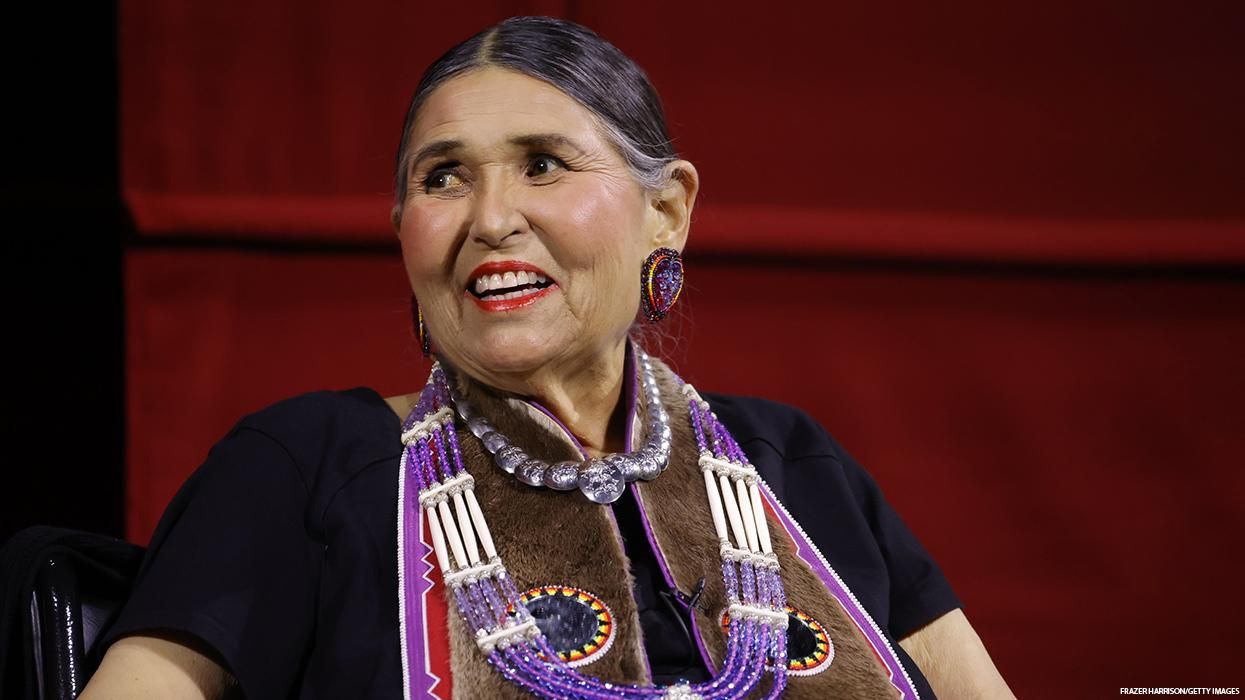Native American activist and actor Sacheen Littlefeather, who made history in 1973 when she refused an Oscar on Marlon Brando's behalf, has died at the age of 75.
Passing away peacefully in her home on Sunday, the Academy of Motion Picture Arts and Sciences revealed the news via social media that evening. Littlefeather had been diagnosed with stage 4 breast cancer in 2018, which had metastasized in recent years.
Born Marie Louise Cruz in 1946, Littlefeather's father was Apache and Yaqui. She began exploring her Native identity in college, around the same time she was kindling a love for performing. Littlefeather received her name in 1969 from fellow activists after participating in a Native occupation that attempted to reclaim Alcatraz Island.
Through her activism, Littlefeather also caught the attention of acclaimed actor Marlon Brando, who was making headlines at the time for his performance in The Godfather. While he was nominated for and won the Best Leading Actor at the 45th Oscar Awards, Brando refused to accept the award, instead sending Littlefeather to decline it on his behalf.
Littlefeather became the first Native American to give a speech onstage at the Academy Awards, and did so by speaking out for Native rights. She was unable to read Brando's entire eight-page speech, but gave an improvised summary that highlighted Hollywood's role in oppressing Indigenous populations.
"[Brando] very regretfully cannot accept this very generous award," she told the audience that night. "And the reasons for this being are the treatment of American Indians today by the film industry, and on television in movie reruns, and also with recent happenings at Wounded Knee."
The Wounded Knee Occupation was underway at the time, with 200 followers of the American Indian Movement seizing the town of Wounded Knee, South Dakota, to protest the United States government's failure to uphold treaties with Native American tribes.
Audience members booed and interrupted Littlefeather, before she could continue: "I beg that...in the future, our hearts and understandings meet with love and generosity."
Marlon Brando's Best Actor Oscar win for "The Godfather" | Sacheen Littlefeatheryoutu.be
Upon exiting the stage, Littlefeather was shielded from prominent Western actor John Wayne, who had to be restrained by six security guards to prevent him from assaulting her. The public backlash from her speech permanently blacklisted Littlefeather from the industry, or as she called it, "red-listed."
Before The Wounded Knee Occupation, Littlefeather had participated in a "Ten Little Indians" Playboy shoot in hopes to further her acting career. The project was scrapped after turmoil at Wounded Knee began, but Littlefeather's photos were later published after her Oscars speech in an attempt to discredit her.
Popular pundits at the time also questioned her Native heritage, an accusation so severe that it was invoked as recently as 2012, when Dennis Miller mocked Elizabeth Warren by calling her “as much Indian as that stripper chick Brando sent to pick up his Oscar."
Littlefeather's acting career never recovered, eventually prompting her to study nutrition and traditional medicine. She then went on to work in Mother Teresa’s AIDS hospice in San Francisco.
Despite her egregious public and private mistreatment, the Academy did not issue an apology to Littlefeather until June of this year, nearly 50 years later. A ceremony was held in August to formally apologize to her in person.
A letter from David Rubin, President of The Academy, read in part: "The abuse you endured because of this statement was unwarranted and unjustified. The emotional burden you have lived through and the cost to your own career in our industry are irreparable. For too long the courage you showed has been unacknowledged. For this, we offer both our deepest apologies and our sincere admiration."
Following the apology, Littlefeather told The Hollywood Reporter that she was "stunned" to receive it.
“I never thought I’d live to see the day I would be hearing this, experiencing this," she said. "When I was at the podium in 1973, I stood there alone...Yes, there’s an apology that’s due. As my friends in the Native community said, it’s long overdue. I could have been dead by now."
Following the 1973 Oscar's ceremony, The New York Times published Brando's full speech that Littlefeather was unable to read. In collaboration with Littlefeather, Brando denounced the depiction of Native Americans in media, an issue that still permeates media to this day.
"The motion picture community has been as responsible as any for degrading the Indian and making a mockery of his character, describing his as savage, hostile and evil," Brando wrote. "It's hard enough for children to grow up in this world. When Indian children watch television, and they watch films, and when they see their race depicted as they are in films, their minds become injured in ways we can never know."
In her interview with THR, Littlefeather recalled Brando's words, noting her pride in the recent steps Native filmmakers have made towards accurate and uplifting representation. She believed that "at long last, somebody is breaking down the doors," despite saying she wouldn't "swear like they do on Reservation Dogs.”
In her last public appearance, where she accepted the Academy's apology, Littlefeather shared that she was not doing so on behalf of herself, but in honor of all Native people and communities.
“I am here accepting this apology, not only for me alone but as acknowledgment, knowing that it was not only for me, but for all of our nations that also need to hear and deserve this apology tonight," she said. "Look at our people. Look at each other and be proud that we stand as survivors, all of us. Please, when I’m gone, always be reminded that whenever you stand for your truth, you will be keeping my voice, and the voices of our nations, and our people, alive.”
Academy Visual History with Sacheen Littlefeatherwww.youtube.com



















































